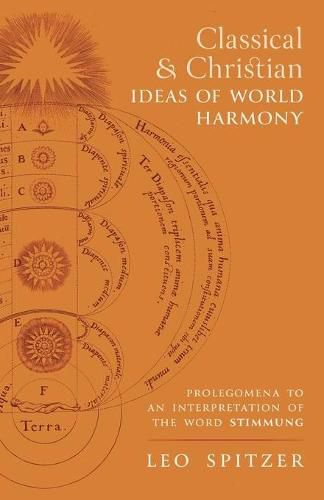Readings Newsletter
Become a Readings Member to make your shopping experience even easier.
Sign in or sign up for free!
You’re not far away from qualifying for FREE standard shipping within Australia
You’ve qualified for FREE standard shipping within Australia
The cart is loading…






This title is printed to order. This book may have been self-published. If so, we cannot guarantee the quality of the content. In the main most books will have gone through the editing process however some may not. We therefore suggest that you be aware of this before ordering this book. If in doubt check either the author or publisher’s details as we are unable to accept any returns unless they are faulty. Please contact us if you have any questions.
Renowned philologist Leo Spitzer’s multitudinous contributions to the fields of etymology and stylistics in many of the Romance languages are widely acknowledged and highly valued. Less well known, but equally engaging, is his extensive work in what he referred to as historical semantics -a study exemplified in his treatise, Classical and Christian Ideas of World Harmony. Key to this study is Spitzer’s use of the term Geist, which he prefers over more mundane descriptors such as intellectual history or history of ideas. For Spitzer, Geist represents the unity of feeling and thought,
atmosphere, or climate of opinion after which he is searching. The present work represents, however, more than a chance example of Spitzer’s method, for its very topic-Stimmung or world harmony -is perfectly emblematic of Spitzer’s understanding of Geist; that is, his conception of the unity of the European spirit, the old world’s feeling for an ordered, even musically ordered, universe. This uniquely fascinating volume is not merely a learned treatise in historical semantics; it is itself a stupendous display of world harmony as a creed-a vivid demonstration that all is all, that everything is related to everything: the planets and the lute, the colors heard and sounds seen, rhyme and nature, the echo and the birds’ song.
$9.00 standard shipping within Australia
FREE standard shipping within Australia for orders over $100.00
Express & International shipping calculated at checkout
This title is printed to order. This book may have been self-published. If so, we cannot guarantee the quality of the content. In the main most books will have gone through the editing process however some may not. We therefore suggest that you be aware of this before ordering this book. If in doubt check either the author or publisher’s details as we are unable to accept any returns unless they are faulty. Please contact us if you have any questions.
Renowned philologist Leo Spitzer’s multitudinous contributions to the fields of etymology and stylistics in many of the Romance languages are widely acknowledged and highly valued. Less well known, but equally engaging, is his extensive work in what he referred to as historical semantics -a study exemplified in his treatise, Classical and Christian Ideas of World Harmony. Key to this study is Spitzer’s use of the term Geist, which he prefers over more mundane descriptors such as intellectual history or history of ideas. For Spitzer, Geist represents the unity of feeling and thought,
atmosphere, or climate of opinion after which he is searching. The present work represents, however, more than a chance example of Spitzer’s method, for its very topic-Stimmung or world harmony -is perfectly emblematic of Spitzer’s understanding of Geist; that is, his conception of the unity of the European spirit, the old world’s feeling for an ordered, even musically ordered, universe. This uniquely fascinating volume is not merely a learned treatise in historical semantics; it is itself a stupendous display of world harmony as a creed-a vivid demonstration that all is all, that everything is related to everything: the planets and the lute, the colors heard and sounds seen, rhyme and nature, the echo and the birds’ song.